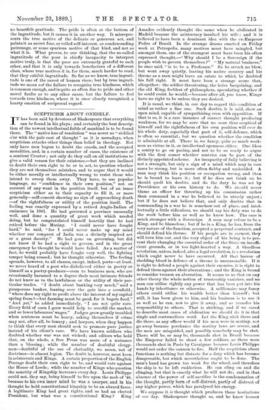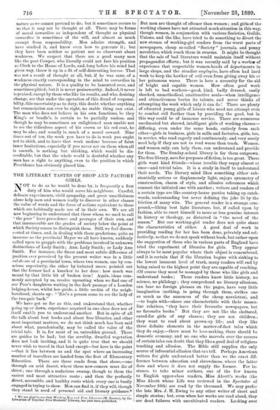SCEPTICISM ABOUT ONESELF.
IT has been said by devotees of Shakespeare that everything can be found in his plays; and certainly the best descrip- tion of the newest intellectual foible of mankind is to be found there. The " native hue of resolution " was never so " sicklied o'er with the pale cast of thought " as it is nowadays, when scepticism attacks other things than belief in theology. Not only have men begun to doubt the creeds, and the accepted moralities, and, in a certain number of cases, the existence of a sentient Creator ; not only do they call on all institutions to eve a valid reason for their existence,—bit they are inclined to doubt their own right to be or to act, to question whether they are not themselves mistakes, and to argue that it would be either morally or intellectually wrong to resist those who intend to sweep them away. They have, to use popular language, no " confidence in their own position," not on account of any want in the position itself, but of an inner scepticism either as to their capacity to fill it, or more generally—self-conceit showing no sign of approaching death —of the rightfulness or utility of the position itself. The feeling was exactly expressed by a retired Anglo-Indian of eminence in 1861. He had governed a province unusually well, and done a quantity of great work which needed doing, but he congratulated himself heartily that he had retired before the Mutiny. " I could never have fought hard," he said, " for I could never make up my mind whether our conquest of India was a divinely inspired act or a great dacoity." He had gone on governing, but did not know if he had a right to govern, and in the great emergency he thought he would have failed. As a matter of fact, he would probably have fought very well, the fighting temper being roused ; but he thought otherwise. The feeling spreads, however, to all classes, except, indeed, poets—at least, we never heard of a poet who disbelieved either in poetry or himself as a poetry-producer—even to business men, who are occasionally harassed to a degree their most intimate friends do not know as to the lawfulness or the utility of their par- ticular trades. " I doubt about banking very much," said a prosperous banker, leaning over the gate into a cornfield ; "where does my right to profit above the interest of my capital spring from ?—but farming must be good, for it begets food." " And yet," he added immediately, " I am not quite sure. Every field of corn I grew would help to overfill the market, and so lower labourers' wages." Judges grow greatly troubled when sentences must be heavy, asking themselves if crime may not, after all, be lunacy ; and lawyers, when they happen to think that every man should seek to promote pure justice instead of his client's case. We have known soldiers who doubted whether war was not wicked ; and editors who held that, on the whole, a free Press was more of a nuisance than a blessing ; while the number of doubtful clergy- men—doubtful of the use of clericality, we mean, not of doctrines—is almost legion. The doubt is, however, most keen in aristocrats and Kings. A certain proportion of the English Peerage doubt their own right to be, and would vote against the House of Lords; while the number of Kings who question the sanctity of Kingship increases every day. Louis Philippe could not, they say, bring himself to fire upon the mob of '48, because to his own inner mind he was a usurper, and in his thought he held constitutional kingship to be an absurd farce. A legitimate King had great rights, and so had an elected President, but what was a constitutional King ? King Amadeo evidently thought the same when he abdicated in Madrid because the aristocracy insulted his wife ; and it is believed to have been a dominant idea with the ex-Emperor Pedro of Brazil. In the strange drama enacted on Friday week at Petropolis, many motives must have mingled, but amongst them, one of the strongest must have been his often expressed thought,—" Why should I be a Sovereign if the people wish to govern themselves ?" " My natural business," he once said, " is to be a Professor." So he struck no blow, but went away quietly, leaving his native country and his throne as a man might leave an estate to which he doubted his full right. It must have been a strange scene that, altogether: the soldier threatening, the heirs bargaining, and the old King, feeblest of philosophers, speculating whether if he could resist he would,—because after all, you know, Kings have no right to be unless they are desired.
It is usual, we think, in our day to regard this condition of mind as rather a fine one. Such doubts, it is said, show an open mind, capable of sympathising even with opposition. If that is so, it is a rare instance of correct thought producing weakness, for we may be sure that no man thus sceptical of himself and the rightfulness of his own position will ever do his whole duty, especially that part of it, self-defence, which is often so essential ; but we question whether the condition is admirable at all. There is, we fancy, quite as much weak- ness as virtue in it, or intellectual openness either. One likes a sentry to go on pacing, and not to be so ready to argue with the first comer whether sentries can be part of the divinely appointed scheme. An incapacity of fully believing is not a strength, but only a sign of a mind which may in rare eases be strong, but is more often flabby and undecided. A. man may think his position or occupation wrong, and then he is bound to leave it ; but if he does not think so, he should quell his doubts, and do the duty he was set by Providence or his own history to do. We should never blame an officer for throwing up his commission rather than command in a war he believed to be utterly unjust ; but if he does not believe that, and only doubts that in commanding in a war he is somehow out of place, and intel- lectually a little ridiculous, we should say his duty was to do the work before him as well as he knew how. The case is much stronger with a Sovereign. A man may refuse to be a King, and be blameless ; but if he is a King, he has, from the very nature of the function, accepted a perpetual contract, and should defend his throne. If his people are in earnest, they will turn him out, and the very object of his being is to pre- vent their changing the essential order of the State on insuffi- cient grounds, or in too light-hearted a way. A bloodless revolution, unless, indeed, also a legal revolution, is a revolution which ought never to have occurred. All that horror of shedding blood in defence of a throne is unreasonable. If it is right to defend a people against their enemies, it is right to defend them against their aberrations ; and the King is bound to consider treason an aberration. It seems to us that on any other theory the whole notion of trusteeship vanishes, and no man can utilise rightly any power that has been put into his hands by inheritance or otherwise. A millionaire may fancy others could utilise his wealth better than himself ; but still, it has been given to him, and his business is to use it
as well as he can, no to give it away, and so transfer his responsibility to others. That is shirking, and if we cared to describe most cases of abdication we should do it in that single and contumelious word. Let the King stick there and die there, as any officer would if his men were in mutiny, not go away because perchance the mutiny laws are severe, and the men are misguided, and possibly somebody may be shot. There will be, or may be, thousands shot in Brazil because the Emperor failed to shoot a few soldiers, as there were thousands shot in Paris by Cavaignac because Louis Philippe would not order the cannon to fire. Half the scepticism about functions is nothing but distaste for a duty which has become disagreeable, but which nevertheless ought to be done. The man's hand has grown too weak for the wheel, and therefore the ship is to be left rudderless. He can cling on and die clinging, but that is exactly what he will not do ; and in that absence of the power of self-sacrifice is the condemnation of the thought, partly born of self-distrust, partly of distrust of any higher power, which has paralysed his energy.
We suppose it is thought which produces these hesitations of our day. Shakespeare thought so, and he knew human
nature as we cannot pretend to do ; but it sometimes occurs to tas that it may not be thought at all. There may be forms of moral cowardice as independent of thought as physical cowardice is sometimes of the will, and almost as much exempt from responsibility. Men admire strength, and have studied it, and know even how to generate it ; but they have been neither so patient nor so observant about weakness. We suspect that there are a good many men like the poet Cowper, who literally could not face his position as Clerk to the House of Lords, and, long before his mind had given way, threw it up in a fit of self-distrusting horror. That was not a result of thought at all, but, if he was sane, of a weakness exactly corresponding in the mind to cowardice in the physical nature. It is a quality to be lamented over, and sometimes pitied; but it is never praiseworthy. Indeed, it never is praised, except by those who like its results, and who, desiring change, see that under the operation of this dread of responsi- bility, this uncertainty as to duty, this doubt whether anything but renunciation can ever be right, no stable thing can exist. The man who does not believe in his own functions, be they King's or beadle's, is certain to be partially useless, and though he may be sometimes an enlightened man unable not to see the ridiculous aspect of his crown or his red coat, he may be also, and usually is, much of a moral coward. Nine times out of ten, the work you have to do is work you ought not to shirk, and to leave that work undone because of faint inner hesitations, especially if you never act on them when all is smooth, is nothing but shirking, which would be dis- creditable, but that the whole world is doubtful whether any man has a right to anything, even to the position in which Providence has obviously placed him.







































 Previous page
Previous page